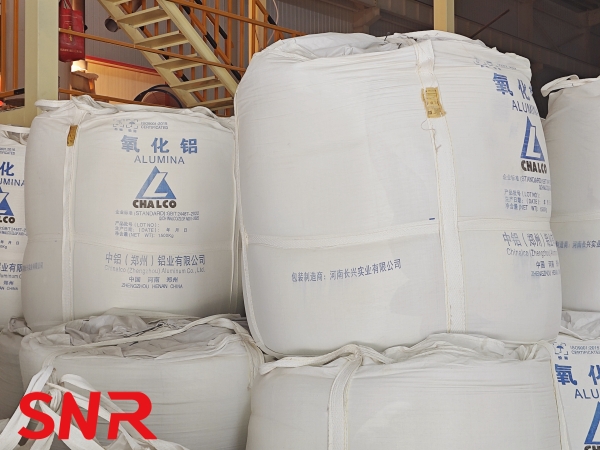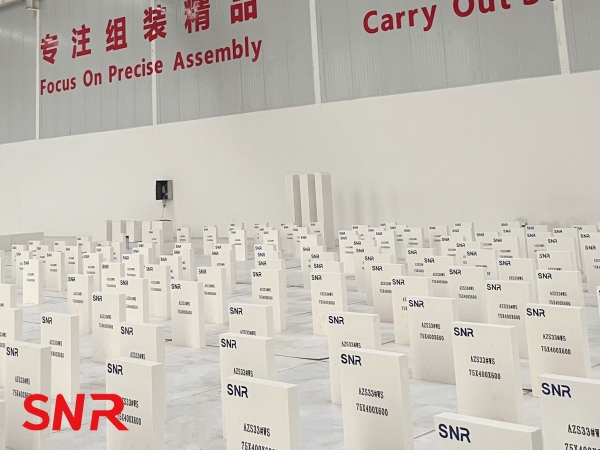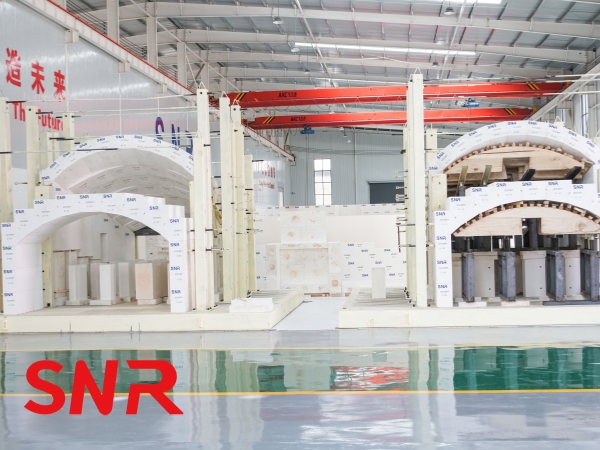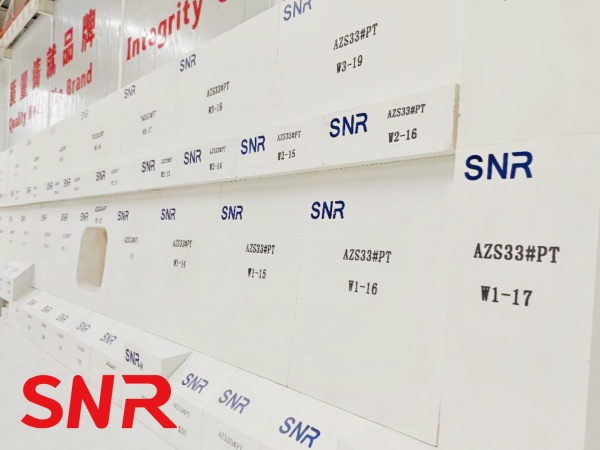
As global awareness of environmental protection increases, every industry is actively exploring green and environmentally friendly production methods. The glass industry is a traditional high-energy consumption and high-pollution industry, and its environmental transformation is particularly urgent. As an important refractory material in the glass industry, fused cast AZS block's environmental performance and sustainable development ability are of great significance in promoting the green development of the entire industry. In this paper, the environmental performance and sustainable development of fused cast AZS block will be discussed, as well as the aspects of the production process, environmental performance, and application in the glass industry.
The production process of fused cast AZS block mainly includes the steps of raw material preparation, batching, melting, casting, annealing, and processing. Compared with the traditional refractory production process, the production process of fused cast AZS block has remarkable environmental protection characteristics.
In the selection and utilization of raw materials, the raw materials of fused cast AZS blocks are mainly high-purity alumina, silica, and other natural minerals, which are widely available in nature and easy to obtain. At the same time, some waste refractories can also be reused as raw materials, reducing the waste of resources.

In the electric melting process, the fused cast AZS block adopts the electric melting furnace for high temperature melting, which does not need to add fuel in the process, reducing the emission of pollutants such as waste gas and waste slag. At the same time, the electric furnace has good sealing, which can effectively prevent the leakage of harmful gases and protect the production environment.
In terms of energy saving and emission reduction, electric energy is the main energy consumption in the production process of fused cast AZS blocks. With the continuous progress of electric power technology, the utilization efficiency of electric energy is continuously improved, which makes the production of fused cast AZS blocks more energy-saving. In addition, the production process of fused cast AZS blocks can also achieve waste heat recovery, further improving energy efficiency.
The following are the specific production process steps:
►Raw material selection and ratio:
The main raw materials of the fused cast AZS block include selected zircon sand and industrial aluminum oxide powder, which are proportioned according to a certain proportion. A small amount of flux is also added to improve the performance and structure of the product.
►Raw material mixing and preparation:
Mix the proportioned raw materials to ensure uniformity. The mixed raw materials are crushed and ground to achieve the desired particle size distribution.
►Fusion:
The uniformly mixed raw material is fed into a single - or three-phase furnace or resistance furnace for high-temperature melting. The melting temperature is usually between 1900 and 2000 °C to ensure that the raw material is completely melted and a uniform melt is formed.
►Casting molding:
The melt is cast at the appropriate temperature into a special mold to form the desired shape and size. The casting process requires strict control of temperature and casting speed to ensure product quality and performance.
►Annealing and cooling:
The raw block after casting needs to be annealed to eliminate the internal stress and improve the stability of the product. The annealed product needs to be cooled naturally or forced to ensure that it achieves the required hardness and strength.
►Machining and inspection:
After cooling, the fused cast AZS block needs to undergo mechanical processing, such as cutting, grinding, etc., to achieve the required size and shape accuracy. Finally, products need to undergo rigorous inspection and testing to ensure that they meet the relevant quality standards and performance requirements.
B.Low emission and no pollution:
The production process of fused cast AZS block does not produce waste gas, waste residue and other pollutants, which is friendly to the environment. The sealing of the electric furnace is good, which can effectively prevent the leakage of harmful gases and protect the production environment.
C.Resource conservation and recycling:
The raw materials of fused cast AZS blocks are mainly high purity alumina and zircon sand, which are widely available in nature and easy to obtain. Part of the waste refractories can also be reused as raw materials to realize the recycling of resources.
D.Green production and sustainable development:
The production process of fused cast AZS block meets the requirements of green production, and the energy consumption and emission are reduced by optimizing the production process and the ratio of raw materials. The excellent performance and long life of the fused cast AZS block make it able to work stably for a long time under high temperature environment, reducing the replacement frequency and maintenance costs.
►Clean energy use:
The production of fused cast AZS blocks mainly relies on electric energy, electric energy as a clean energy, compared with the traditional coal or fuel oil process, in the production process will not produce harmful gas emissions, such as sulfur dioxide, nitrogen oxides, etc., thus significantly reducing air pollution.
►Efficient use of resources:
The raw materials of fused cast AZS blocks are mostly high-purity alumina, zircon stone, etc. These raw materials are strictly screened and proportioned to ensure the high quality of the products. At the same time, in the electromelting process, raw materials are almost completely converted into products, and the resource utilization rate is extremely high, reducing the waste of raw materials.

►Low waste generation:
The production process of fused cast AZS block is highly integrated, and the raw materials are directly melted and formed in the electric furnace, avoiding the waste and waste residue generated in the traditional process. In addition, waste fused cast AZS blocks can also be reused as raw materials after treatment, further reducing the generation of solid waste.
►Low noise pollution:
The production equipment of fused cast AZS block is usually designed with noise reduction measures, compared with other refractory production requiring large mechanical equipment and crushing, grinding and other processes, the noise level of the production process of fused cast AZS blocks is lower, and the noise pollution of the surrounding environment is less.
►High performance and long life:
Because of its excellent high temperature resistance and corrosion resistance, the fused cast AZS block can operate stably in extreme high temperature and corrosive environment for a long time. This high performance and long life reduces the frequency of replacement, thereby reducing the waste and energy consumption caused by frequent replacement.
►Low maintenance requirements:
The high stability and durability of fused cast AZS blocks reduces the need for routine maintenance and reduces the risk of downtime due to equipment failure. This not only improves production efficiency, but also reduces environmental stress and waste of resources due to production disruptions.
►Carbon emission reduction:
Compared to traditional production processes that rely on fossil fuels, the electric drive mode of fused cast AZS blocks reduces greenhouse gas emissions, such as carbon dioxide. As the proportion of renewable energy sources (such as solar and wind) in the electricity supply continues to increase, the carbon emissions of fused cast AZS blocks will be further reduced.
►Environmental adaptability:
Fused cast AZS block has good environmental adaptability and can maintain stable performance in various harsh environments. This helps reduce the frequency of equipment damage and replacement due to environmental changes, thereby reducing the negative impact on the environment.
►Sustainable development:
The environmental performance of fused cast AZS block conforms to the concept of sustainable development. By improving resource utilization, reducing waste generation and reducing carbon emissions, the production and use of fused cast AZS blocks help promote the green transformation and sustainable development of the refractory industry.

In the glass industry, fused cast AZS blocks are widely used in the refractory lining of glass furnaces. Their excellent fire and corrosion resistance make the glass furnace work stably for a long time in harsh environments such as high temperatures and corrosion. At the same time, the environmental performance of the fused cast AZS block also makes the glass industry's production more green and environmentally friendly.
►Improve the life of the glass furnace: The fused cast AZS block has excellent fire and corrosion resistance, which can significantly improve the glass furnace's service life. This reduces the frequency of furnace maintenance and replacement and reduces production costs.
►Optimize the glass production process: The use of fused cast AZS blocks can optimize the glass production process and improve the quality and output of glass products. At the same time, the environmental performance of fused cast AZS blocks also makes the production of glass products more green and environmentally friendly.
►Promote the green development of the glass industry: The wide application of fused cast AZS blocks can promote the green development of the glass industry. By improving the environmental performance of refractory materials and resource utilization efficiency, fused cast AZS blocks can reduce energy consumption and pollutant emissions in the production process and achieve sustainable development of the glass industry.

.png)
To promote the sustainable development of fused cast AZS blocks, it is necessary to start from the following aspects:
Strengthen technology research and development: Committed to the development of higher temperature resistance, erosion resistance, and wear resistance of fused cast AZS block products to meet the changing market demand, while reducing the frequent replacement and waste caused by insufficient product performance.
►Green production process:
Optimize the production process of electric melting blocks, adopt more environmentally friendly and energy-saving production technology and equipment, such as the use of advanced electric melting furnace technology, improve energy utilization efficiency, and reduce the emission of waste gas, waste residue, and other pollutants.
►Raw material innovation and substitution:
Actively seek and develop new raw materials, such as the use of waste refractories, industrial waste, etc. for reprocessing and utilization, reduce the dependence on natural resources, reduce production costs, and realize the recycling of resources.
►Fine management of raw materials:
Fine management of raw materials to ensure the quality and stability of raw materials, improve the utilization of raw materials, and reduce waste.

►Waste recycling and utilization:
Establish a sound waste recycling and treatment system, the waste of fused cast AZS blocks and other waste for recycling, to achieve the maximum utilization of resources.
►Energy saving and emission reduction measures:
Take energy saving and emission reduction measures in the production process, such as optimizing the production process, improving the efficiency of equipment, using clean energy, etc., to reduce energy consumption and carbon emissions.
►Strengthen market publicity:
Through market publicity and promotion, improve the visibility and reputation of fused cast AZS blocks in the glass industry. At the same time, strengthen cooperation and exchanges with glass enterprises to jointly promote the green development of the glass industry.
►Policy guidance and support:
The government should introduce relevant policies to guide and support the sustainable development of fused cast AZS blocks. Through the provision of tax incentives, financial subsidies, and other policy measures to encourage enterprises to increase research and development investment and technological innovation, to promote the green development of the electric melting block industry.
As an important refractory material in the glass industry, fused cast AZS block's environmental performance and sustainable development ability are of great significance in promoting the green development of the entire industry. By strengthening technology research and development, promoting green production, strengthening market publicity, and policy guidance and support measures, we can promote the sustainable development of fused cast AZS blocks. In the future, with the increasing global awareness of environmental protection and the urgent need for green development of the glass industry, the application prospects of fused cast AZS blocks will be broader.
Henan SNR Refractory Co.,ltd (SNR) is dedicated to the manufacture, research, and development of refractory materials for the glass industry. Armed with a strong technical force, well-equipped facilities, advanced technologies, and complete laboratory testing methods, SNR can produce high-quality refractory materials for glass furnaces. At the same time, SNR can provide the whole solution and service of glass furnace design, glass furnace construction, renovation, and upgrading. If you have any needs, please contact us.

Emali:moon@snrefractory.com Web:www.snrefractory.com